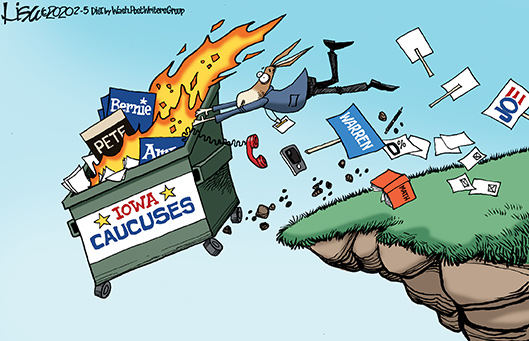Caucus Mockus

By Lisa Benson, WaPo Writers Group
So, the Iowa caucuses were a bit of a shitshow this year, and people all over the political world are to some extent losing their minds, including the esteemed Mr. Hayes, above. As if this was something new.
Iowa caucuses have been a mess for a long time, this shouldn't surprise anybody. Remember 2012, when Mitt Romney won Iowa, no wait, Ron Paul did, no wait, Rick Santorum did? There wasn't even a mobile app to blame then. Yes, the Iowa state Democratic Party screwed the pooch on this. No question. But let's not make a bigger deal of it than it is; Iowa fucks up, it's normal, and eventually we get results that are agreed upon.
That said, I do think things should change. The wonks on Pod Save America predict this was the last time we'd have Iowa caucuses, at least as we've known them since the modern process started in 1972. I don't see that happening, because this mess will be forgotten just as all previous Iowa caucus messes have been. But the problems are undeniable.
Ultimately, I think I agree with Chris Hayes. Doing away with the caucus process and having every state adopt a primary instead would be more democratic, more inclusive, more understandable. It'd be better. Yet, I like caucuses. I'd miss them.
I've attended the Washington State Democratic caucuses in 1992, 2000, 2004, 2008, and 2016, skipping the years when incumbent Democrats were running for reelection and had essentially no competitors. They're fun. For political nerds like me, anyway; they aren't continuously fun, they also involve a great deal of boredom and standing/sitting around. But when stuff is happening, it's neat. It's talking with your neighbors about important national issues and advocating for your chosen candidate. It can also mean greater participation in the whole lengthy campaign—in 2004, I was elected as a delegate for the John Kerry campaign (which I had been doing considerable volunteer work for over many months by then) to the next stage in the nominating process, the district caucus, and had circumstances permitted I would have run for delegate to county and state conventions.
One positive element to caucuses is the ability to switch your allegiance. In a way, it seems unfair, but in the end it's a good thing: If your chosen candidate does not have enough support in your precinct to net a delegate, you may join the group supporting a different candidate so your participation will aid your choice of the remaining options. This happened to me in 1992, my first caucus—I was the only one in my precinct supporting Jerry Brown, thus Governor Moonbeam was unviable there, having less than 15% support. So was Senator Paul Simon. I then opted to join the Clinton supporters over the Paul Tsongas supporters. In the moment I didn't like this, but had the state apportioned delegates via primary election, my vote for Brown would have contributed zero while my caucus support for Clinton gave him one more delegate at the precinct level. Similarly, in 2008—before the scandal broke—I was in the John Edwards camp, but again was in a sub-15% minority and thus had the chance to throw my support to Barack Obama and help him take the state over Hillary Clinton. Of course, calculating voters can make strategic votes in primaries by making assumptions on viability ahead of time, but I still like the process.
We should get rid of it, though.
Caucuses by design limit participation and effectively disenfranchise voters who for whatever reason cannot devote several hours to go to a school gym or a church basement or wherever. They discourage those who simply don't want to give up their afternoon (or evening, in Iowa). They are not a secret ballot, which can keep people away. People who are not comfortable speaking up in groups or who have social anxiety issues won't participate. Elections, on the other hand, are simple. Especially here, where it's all done by mail (or neighborhood drop box). Far more voters can participate. Sure, there are election security issues that caucuses avoid, but as we see every time, there are caucus administration issues that are inevitable. And elections, done right, have a paper trail that can be audited while caucuses can be comparatively recordless proceedings.
Oh, and caucus or not, Iowa has had its fun being first. Time to share that honor around. Yes, yes, they like it so much (as does New Hampshire) that they have a state law mandating they be first, but let's be serious. Let's revamp this to give (a) a more populous and diverse state (say, Georgia? Michigan?) the influence of being first, and (b) change up the order every cycle, so it isn't always the same three or four states that winnow the field. Iowa and New Hampshire have the most influence on who gets nominated, always. South Carolina got in on it recently, and more recently Nevada got in on things, but by the time any large population gets to vote, the field has been cut considerably. Every damn time.
So, change it up. Put in a rotation system. Not necessarily random, I mean, having California go first might be its own problem, but put some thought into it. Albino Iowa and palesnow New Hampshire can go later. Maybe on Super Tuesday.



Comments
No comments yet.
Add your comment
RSS feed for comments on this post | RSS feed for all comments